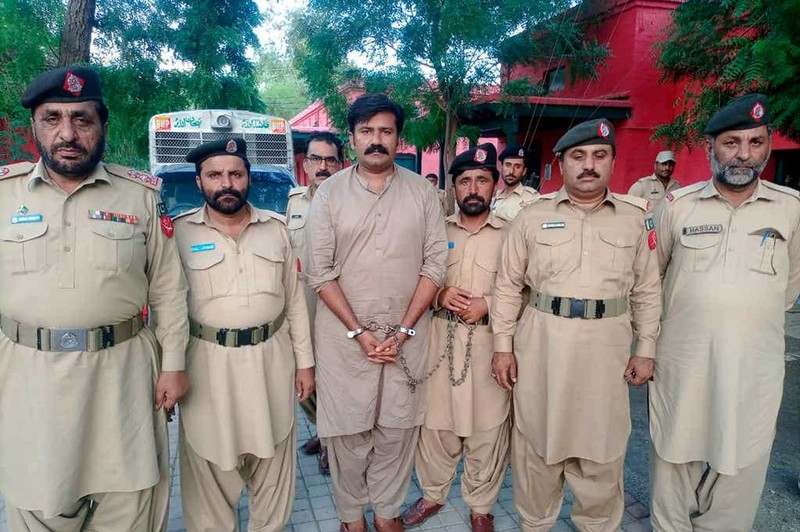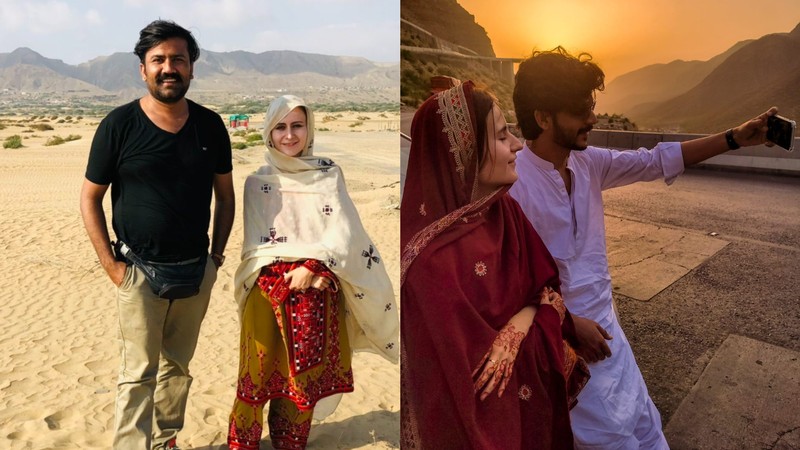Woman wanted to showcase "safe" side of Pakistan---then she was gang raped
The audacious assault of an American woman in Pakistan is disrupting a narrative created by Western influencers that the country is safe for women.
Arabela Arpi, a 21-year-old American-German student at Duke University, North Carolina, describes her first visit to Pakistan as a romantic encounter: anticipation, exploration, and, finally, love.
“I first came here in 2019 to visit my fiance’s family, who live in Lahore,” Arpi told VICE World News over a Zoom call from Durham, North Carolina. “Travelling to Pakistan was unlike any other destination, where everything is catered to tourists. In Pakistan, people follow their own traditions, wear their traditional clothes and eat their traditional food. It’s culturally vivid.”
She was also aware of Pakistan’s image in popular culture, with news of security concerns, and being listed among the world's most unsafe countries. But Arpi, with an Instagram following of more than 23,000 and a prolific travel blog, saw a chance to go “off the beaten path” – mostly solo, and in areas foreigners can’t easily access. She also followed Western female influencers, who posted about travelling in Pakistan with comfort, safety and privileged access. This is despite a 2021 survey showing that 80 percent of Pakistanis think women aren’t safe in their own country.
On July 17, while visiting the city of Dera Ghazi Khan in Pakistan’s Punjab province, Arpi said she was threatened, extorted and then “brutally” gang raped by two men she had befriended during her previous travels, one of whom filmed the act and threatened to leak it. A case of rape and filming obscene acts was registered by the Border Military Police on July 19. Arpi also said she was misled to believe she had permission to stay in the city, which has a history of militancy and usually isn’t included in the cities tourists can visit with their visas. A trial is underway, with one accused still at large.
Pic of one of the Rapists arrested

Pakistan reports an average of 11 rapes a day; fewer than 3 percent of those rapes lead to court convictions. But sexual violence against a foreigner is extremely rare.
Arpi’s case has put the spotlight on Western influencers who explore undiscovered parts of Pakistan for hundreds of thousands followers, without mentioning the precautions locals take traveling to areas with poor tourism infrastructure.
In the billion-dollar global influencer market, Pakistan’s tourism provides a complex picture, with alleged links to the state and military, and mounting criticisms of foreigners whitewashing lived realities.
“Foreign vloggers often paint a much more positive picture about how easy it is to travel around Pakistan than it really is,” Michael Kugelman, a senior associate for South Asia at the U.S. think tank Wilson Center, told VICE World News. “This poses risks for people unfamiliar with Pakistan who come in from abroad.”
Over the last four years, Arpi, who holds both German and American passports, said she travelled extensively through private travel agencies and “friends” she made online. Her Instagram posts provide a footprint of her experiences: From the desert province of Balochistan, to the bustling cities like Karachi, to the colourful Sufi shrines in Sindh. She is often seen in traditional Pakistani clothes while extolling facts about the location, almost like a tourism manual. She clarified she’s never been on a government-sponsored tour.
Arpi met the man she accuses of raping and blackmailing her, Muzamil Sipra, on Couchsurfing, where he has a verified profile. The social media website that connects travellers across the world has a history of being misused by men for sexually violating women.
Sipra, said Arpi, claimed he had connections in high places, including the Pakistani intelligence, through which he allegedly gained access to restricted locations. She also said he intimidated her by showing photos of him with guns. The second man Arpi accuses of rape, Aazan Safdar, is still at large and applied for pre-arrest bail on August 6. Sardar has been posting on TikTok, including one where he asks his followers to support him during the impending trial. On August 10, his bail request was denied.
VICE World News tried to contact officials in charge of the case but did not immediately receive a response.
Arpi said she managed to leave after promising the accused she would not report the incident. “The rape was one thing,” Arpi said. “But what happened after was equally tormenting.” Arpi said that in Lahore, she tried to register a police report and get a medical examination but officials refused, saying she needed to go back to Dera Ghazi Khan. By the time she arrived back, it had been 36 hours since the rape.
“I was in the same clothes for nearly three days,” she said. At the hospital, Arpi said she was subjected to the two-finger test, which was declared unconstitutional by Pakistan’s Supreme Court last year. She added that even though she had bruises on her body, the medical practitioner didn’t mention them in the medico-legal report. Her DNA test came out on July 28, confirming the rape 11 days after it happened.
In this photo, Arpi is pictured with the two men who raped her

“The process showed that if someone of my kind of privilege can struggle to get justice, imagine what happens to all the women in Pakistan who don’t have the same resources that we do,” said Basil Khan, Arpi’s fiance. The couple left for the U.S. shortly afterwards to pursue the case and the U.S. embassy in Pakistan is closely monitoring and supporting the case.
Source:https://www.vice.com/en/article/wxnj5n/arabela-arpi-pakistan-gang-rape-american-german-blogger






